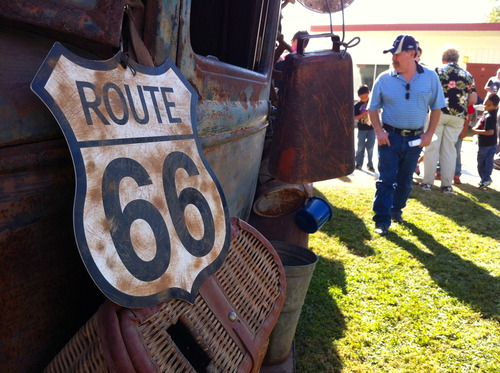|
UCSD’s theater dept. is mounting a production of “The Grapes of Wrath” this month — Frank Galati’s superlative stage adaptation of John Steinbeck’s landmark novel. Galati won a pair of Tonys after initially bringing this story to the stage at Chicago’s Steppenwolf Theatre Co., and my former colleague, theater critic Hedy Weiss, described the adaptation’s faithfulness to the source material as “not only uncompromising, but devoid of sentimentality, and that it is flawless in the way it sweeps us into the lives of the characters, and their time, without a wasted word or motion.” Hard to go wrong with source material this great. Just a couple of weeks ago, I was hanging with the Joads myself. Every third Saturday in October, for nearly 25 years now, the Dust Bowl Festival is held next to the site of the "Weedpatch" camp where Steinbeck’s hard-scrabble Joad family wound up once they finally arrived in the southern-California promised land. The event — like any smalltown festival, all booths, bands, and burgers — functions as a reunion of sorts for folks with ties to the actual Weedpatch camp or some of the many others in the southern valley surrounding Bakersfield. I wrote a lengthy piece about the event for This Land Press, publishing soon, after enjoying the festival and chatting with many genial Okies about their experiences and memories. Earl Shelton, for instance, arrived at Weedpatch in 1941 at age 7, and after the rough trip west from his dad’s dead Oklahoma farm, life at the camp was a dream. “Clean water, nice toilets, baseball, bands and dances on Saturday nights — we had the time of our lives, believe it,” he said, brightening at the recollections. “Yessir, mighty nice.”
But Shelton also cops to the fact that his father shielded him and his brothers from the worst, keeping them fed while he often went hungry. Life for those workers was not, as many others told me, purty. The things they accomplished in the face of adversity, though, are why this particular struggle and its crafted aesthetics remain celebrated in Steinbeckian stories, shows, and songs. I always thought the Rev. Casy was the real hero of Grapes, as he’s the one who makes the first hard and costly choice to turn from “pie in the sky” preaching and place his faith in the capital-p People. That’s what inspired Woody Guthrie and, in turn, Dylan. Who knew: The Weedpatch camp is still active today — as the Arvin Migrant Labor Center, with neat two-bedroom cabins available for $11.50/day — and the state remains ever-dependent on this shadow force of drifting workers, now mainly from Mexico.
0 Comments
Leave a Reply. |
this blahg
I'm THOMAS CONNER, Ph.D. in Communication & STS, and a longtime culture journalist. Categories
All
Archives
June 2024
|


 RSS Feed
RSS Feed